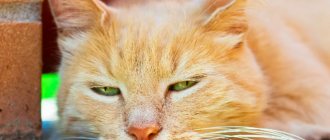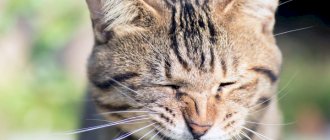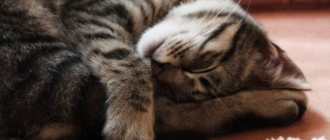Most cat owners are faced with the problem of a kitten constantly squeaking when it first comes into the house. The baby can meow almost non-stop, day after day. Not understanding the reason for this behavior, the owner may become nervous and irritated.
It is very important to understand what can provoke a kitten to meow and find ways to solve the situation.
Helping a cat with choking
If your cat is choking, you should see a veterinarian as soon as possible. If it is not possible to show the animal to a specialist, try to quickly remove the object from the animal’s throat/mouth yourself (except for needles and sharp objects - only a veterinarian can remove them!). Be careful and attentive, as in this state the cat experiences panic and may become aggressive.
Secure your pet and place the index finger and thumb of one hand on his upper lip, pressing it against his jaw. Open the cat's mouth with your other hand
Gently pull on the tongue to examine the throat and mouth. Try removing the foreign object with tweezers
Factors leading to loss of voice in an animal include:
- Keeping an animal in a room where there is frequent smoking. Cigarette smoke contains high levels of irritating toxic substances that can cause laryngeal swelling in your pet. In this case, the cat often has a hoarse voice.
- The dryness of the air in a room or apartment, especially during the heating season, provokes irritation and dryness of the laryngeal mucosa, hoarseness, and sometimes leads to a complete loss of the cat’s voice.
- Respiratory poisoning of an animal by toxic fumes from paint coatings, organic solvents, and disinfectants. Spraying household aerosols, cosmetics (varnishes, deodorants, etc.) can also cause hoarseness in a cat.
- After anesthesia, the animal may become hoarse for a short period of time.
Examination and treatment at home
If your pet begins to cough, his voice disappears and he begins to feel sick, you can try to help him at home. This is possible if the owner is able to independently eliminate the cause, for example, move the animal to a ventilated room or remove a foreign body from its throat. Examination of the larynx allows one to draw primary conclusions about the cause and condition of the animal. If your throat is red and swollen, it is most likely due to an allergy or infection.
You can give your pet an antihistamine, for example, Tavegil or Suprastin, they will help slightly eliminate the first symptoms before being examined by a doctor. A cold or infectious disease, for example, laryngitis, requires complex treatment, which must be carried out by a veterinarian.
Other problems with the larynx
Because the larynx is important to a cat's vocalizations, a cat may lose its voice due to other problems with the larynx. Laryngeal paralysis is one such problem. The larynx should open when you inhale and close when you exhale. When the larynx is paralyzed, this may not happen. Thus, laryngeal paralysis can obstruct the airway, which can be life-threatening.
Symptoms usually begin with shortness of breath and hoarse meowing. Since the obstruction is the problem, the sound should seem to come from the throat. Stridor is also associated with laryngeal paralysis. Unlike a cat's hoarse voice, stridor means that the pitch of the sound is raised and the voice sounds squeaky. As the paralysis progresses and because the vocal cords are in the larynx, a raspy voice can lead to voice loss.
The causes of laryngeal paralysis in cats are usually idiopathic, meaning we don't know why it occurs. However, trauma to the larynx, muscle disorders and even genetics can play a role. Treatment will depend on the patient and how far advanced their condition is. In general, cats with less severe clinical signs can be treated with medication, but severe cases may require surgery.
Finding the answer
| Question No. 299588 |
Good afternoon, how to write “mur meow” correctly? Hyphenated or separate?
Russian help desk response
The spelling is not codified. You can write it with a space or a hyphen.
Hello. Please tell me what the verb “babachit” means.
And around him is a rabble of thin-necked leaders, He plays with the services of semi-humans. Who whistles, who meows, who whines, He alone babbles and pokes
(O. Mandelstam. “We live without feeling the country beneath us.”)
Russian help desk response
Babachit is apparently the author’s neologism of O. Mandelstam (although it is possible that this word may exist in some dialects). If this is a neologism, then the poet brilliantly managed to create a word that does not have an unambiguous “translation” into Russian, but has negative connotations. This is close in sound to the verb babahat ('to make sounds reminiscent of a roar from a shot, explosion, fall, blow; beat, knock, hit'), and, perhaps, an allusion to Babai, which is used to scare children. Thus, the word babachit performs several functions at once - and acts as a contrast to the words meow chit, whines (these squeaky sounds are made by half-humans, and Stalin is babachet), and indicates something unknown, but evil and terrible, that comes from Stalin.
Please tell me, in the title of the article: “Meow - meow, how much is there in this sound”, should “meow - meow” be put in quotation marks? Thank you in advance
Russian help desk response
If you focus on the words of Pushkin _Moscow. As there is a lot of this sound_, it is better to write it the same way: _ Meow - meow. there is so much in this sound_.
Good morning! Please dispel doubts! 1) How to say correctly: on Wednesdays or on Wednesdays (meaning the day of the week); 2) The cat meows, does the cat meow even?
Russian help desk response
1. Both options are correct. 2. Correct: _ meow reads and _ meow kats__.
Source
More serious reasons for cat silence
Although in most cases a cat's reluctance to make sounds is due to its personality, sometimes silence can be caused by physiological problems. If you suspect something like this, or the animal suddenly stops meowing, you should contact your veterinarian.
Upper respiratory tract infections
As in humans, upper respiratory tract infections can cause laryngitis and hoarseness in felines. The cessation of meowing is a symptom of the disease if it is accompanied by other signs of infection: runny nose, lacrimation, apathy, discharge from the eyes or nose. The problem is resolved by a veterinarian who prescribes the necessary treatment.
Hyperthyroidism
In “elderly” individuals, an overactive thyroid gland provokes hoarseness and weight loss. If these symptoms appear, you should contact the clinic: based on a blood test, a specialist will prescribe appropriate therapy.
Laryngeal paralysis
In rare cases, a cat's laryngeal nerves are damaged, which leads to changes in sound pronunciation and also disrupts the respiratory process. These changes may include coughing, difficulty swallowing food, and weight loss. Laryngeal paralysis is a serious condition that requires immediate veterinary attention.
Tumors and polyps
Growths of various types (from harmless polyps to serious cancerous tumors) in the throat and vocal cords can lead to a cat's inability to make sounds. If, along with hoarseness, the animal’s voice changes, the pet begins to sneeze, cough, and often suffers from ear infections, it needs to be examined at the clinic. If cancer is suspected, the veterinarian may take a tissue sample for a biopsy.
In most cases, cat silence is the choice of the animal or its individual characteristic. If there are no other changes in your pet's behavior, there is no need to worry. The stop of sound pronunciation, associated with a violation of the cat’s normal physiological state, deserves increased attention; In such a situation, one cannot do without the professional opinion of a veterinarian.
Is it natural for a cat to remain silent?
If you are used to hearing your furry friend meow, and suddenly notice that he has been silent for a long time, this is a reason to take a closer look at your pet. The appearance of lethargy and depression is a reason to contact a veterinarian. If the cat has always not been very talkative, but at the same time looks happy and healthy, there is no need to worry, silence is inherent in its nature, which is quite normal for representatives of the cat family.
Animals have personality. Among them, as among people, there are notorious talkers. The breed also leaves its mark on the “loquaciousness”. Siamese cats tend to meow frequently and loudly, while Burmese cats are silent by nature. You need to worry if an animal that is willing to communicate suddenly stops making sounds.
Cats generally rarely use vocal signals as a way to communicate with each other; the exception is the mother and cubs. Many scientists believe that animals communicate with people in the same manner as an adult does with kittens.
Meowing directed at humans was formed during the process of domestication; Now this is one of the ways a pet can interact with its owner. Because In the adult cat community, it is not customary to “talk”; the kitten becomes more silent with age. Therefore, the gradually decreasing number of sounds your cat makes as she gets older should not be a cause for concern.
Adviсe
- Try talking to your pet and see if he responds. The conversation should resemble a friendly one. You can pause, as when communicating with people, so that the cat becomes a full participant in the “conversation.”
- When addressing an animal, look in its direction - this way you will encourage it to meow in response. Make sure the cat understands that the speech is directed specifically at her.
- Show your furry friend a video or listen to an audio recording of cats and see if he reacts.
What else you need to know about the causes of voice loss in cats
It's good if you know the cause of the disease. After the operation under anesthesia, you were warned about possible silence until the animal fully recovered. You should protect your cat from hypothermia and follow all recommendations.
It’s good if the pet’s silence is short-term and the voice is restored on its own. But you should always be attentive to the accompanying symptoms. Strange behavior, fear of familiar objects, people, drooling, changes in appearance, fear of bright light and water, refusal to eat indicate a fatal disease - rabies in cats. There is no need to experiment or invent a treatment. The infection could have occurred a long time ago, and all this time the family and the owner himself were in danger and were close to the dying infected cat. Contact your doctor immediately.
Reasons for a cat's constant meowing
To eliminate the problem of constant meowing, or excessive vocalization, it is necessary to accurately determine its cause. In cases where a cat has been living in a family for a long time, this is not difficult, since all the features of its behavior are known. The reasons may be different:
- breed inclination - some cat breeds, for example, Siamese and Abyssinian cats, love to “talk” more than others;
- situational conditioning - in a number of situations, a cat attracts a person’s attention, for example, when it cannot open the door, the tray is not cleaned, there is no water in the bowl - very often this is how the cat communicates and indicates an existing external problem;
- character traits and peculiarities of raising a particular cat: the cat may lack communication - you should definitely pay attention to the cat, play with it, talk to it, caress it;
- the cat may be overly impressionable - if there are any changes in the way of life, for example, moving, getting a new pet, change of owner, the cat may become stressed; you should communicate with the cat more often, take care of it, and its anxiety will pass;
It is necessary to clarify the reason for the constant meowing of cats
- she cannot stand loneliness - a cat can start screaming when left alone for a long time, it is better, of course, not to leave her alone, but as a compromise it is worth offering her more toys or equipping a bed on the windowsill where she can look at the birds (in the same way the aquarium also has the effect);
- requires food outside of school hours - in this case, you should not follow the cat’s lead, especially when she screams loudly and demandingly, so as not to reinforce an undesirable behavior pattern in the pet; food can be put in when the cat calms down or if she asks quietly;
- the cat is nocturnal - it is natural in the wild, but sometimes the cat tries to involve the owner in its nocturnal life, demanding attention and emitting screams, in this case the cat should not be allowed to get enough sleep during the day, physically stress it with games to the point of fatigue and feed generously at night - a tired and well-fed cat will fall asleep and will not bother anyone at night;
- development of an infectious disease (viral leukemia, cryptococcosis, feline panleukopenia, rabies);











